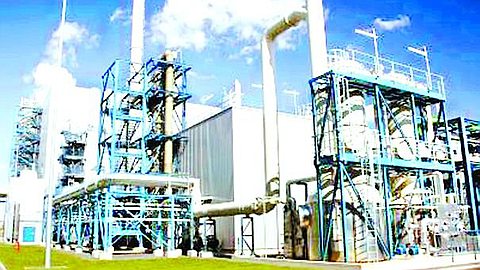USAID energy adviser, has been in Mauritius to discuss renewable energy issues
Mr. Romance Sampa, the USAID Southern Africa Trade Hub (SATH) energy advisor, has been in Mauritius to discuss renewable energy issues and determine training needs.
He met officials at the Ministry of Energy and Public Utilities, the Central Electricity Board, as well as private sector institutions and operators such as the Joint Economic Council, the Mauritius Sugar Producers Association, Omnicane, and Compagnie Thermique de Belle Vue.
SATH, in collaboration for the Southern African Development Community (SADC), is in the process of organising a training programme aimed at equipping officials responsible for energy planning with skills and tools to undertake renewable energy resource assessment, data collection and analysis.
This would give them the capacity to aid renewable energy policy formulation and planning for environmentally sound energy economies, according to SATH. In order to design suitable training, SATH is undertaking a renewable energy training needs assessment of selected SADC countries, including Mauritius.
•What is the purpose of your visit to Mauritius?
I want to assess training needs, as USAID is supporting SADC in a training workshop on renewable energy which will take place in July in Namibia. SADC energy ministers have made renewable energy a priority given the abundance of renewable energy resource in Southern Africa, but which has so far not played a major economic role in Mauritius.
•You have met government officials and discussed training needs with them. What are the priorities?
I met with a senior official of Public Utilities and Renewable Energy, as well as other officials during a workshop. It is my understanding that the government is in the process of establishing a regulatory body for the energy sector.
One of the concerns was that there is little local expertise in that area, thus the government welcomes assistance in capacity-building for the specific purpose of regulation. This is what we will be working on providing them.
I also met with Central Electricity Board officials, who told me about the substantial public response to the grid project whereby it will be possible for individual homes or businesses to sell surplus energy to the CEB. The CEB wants to ensure its capacity to manage this surplus on the existing grid and this is also an area where we are hoping we can help.
•What were the issues raised by the private sector during your meetings?
I met with the Joint Economic Council, the Mauritius Sugar Producers Association and Omnicane. They seemed to be very eager for the energy regulatory body to be created so that there is a levelplaying field for all involved in the business of energy production in Mauritius.
As long as some rules are not clear to them, they cannot invest… but as we said before, the government is working on this aspect.
•You must be aware of the prime minister 's statement whereby Mauritius was setting a renewable energy target of 35% of domestic production by 2025. What is your view of this goal? Can it be attained?
Mauritius is very knowledgeable in renewable, as compared to the rest of southern Africa. In that part of the world, it is still “exotic” and not seen as a viable solution to energy issues or crises.
In Africa, regular grid connection is the most stable energy supply option. In Mauritius, where bagasse has been in use for a long time, there already is awareness of the validity of renewable energy.
Also, as I said before, the great response the population has shown to small independent power producer project and solar water heater schemes shows the awareness and knowledge of Mauritius in matters of renewable energy in comparison to African counterparts.
•So much so, perhaps, that sometimes there are challenges to projects such as waste-to-energy. What is your view of this type of renewable energy production?
In my opinion, as it is a resource that exists, it should be utilised. From both the economic and environmental perspectives, it can only be beneficial, especially since it means getting rid of waste and generating money at the same time. As for the concerns, no source of energy production is ever entirely free of ecological impact

